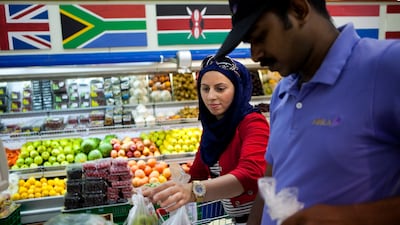More than half of consumers in the UAE and Saudi Arabia say they’re cutting back on spending, amid rising inflation and an increase in the cost of basic goods.
A study by McKinsey, the management consulting firm, also found the number of people who shop for products online has doubled in the past two years, with 42 per cent receiving online deliveries at least once per week, including groceries, household cleaning products, consumer electronics and clothing.
The Middle East Consumer Sentiment Survey asked more than 2,200 people in Saudi Arabia and the UAE about their spending habits.
Consumers, especially those in Saudi Arabia, said they are increasingly cost-conscious and are less loyal to brands, with more than half actively looking for cheaper alternatives.
There are several reasons why. Pandemic shopping habits have remained, while others have found that Amazon-style online marketplaces are selling basic foodstuffs for less than supermarkets will.
“Economic uncertainty, job insecurity and a protracted pandemic have made consumers more price conscious,” the global consultancy firm said in a report this week.
“More than 50 percent of consumers in both the UAE and Saudi Arabia are cutting back on spending.
“Consumers in both countries are actively trading down and looking for cheaper grocery options that offer similar quality, with the change being the most pronounced in the lower income groups.”
Respondents from both countries said they were forced to make adjustments to their spending habits over the past two years, in order to regain some of their purchasing power.
Price sensitive, digitally savvy

The report found that a new type of consumer is emerging in the Gulf region, one who is more “price sensitive, digitally savvy, and socially responsible”.
People said they also have less time to shop in person than they did in the pandemic, with many now preferring a digital first approach to shopping which has led to an exponential increase in e-commerce adoption in the Gulf region.
Younger, internet-savvy populations are driving the increase, the report said.
“Incumbent retailers are competing with a growing number of digital market entrants, including super apps, social media players, aggregators and global e-marketplaces,” it added.
This trend is expected to gain pace over the next few years, with the UAE retail mobile-commerce market projected to grow at 19 per cent annually by 2025.
Moving away from finance, shoppers have also become more conscious of social issues, by choosing products and supporting brands that are good for them, good for their neighbours and good for the planet.
The report found that conscious eating is also on the rise, with around 51 per cent of UAE-based consumers reading nutrition labels before purchasing foodstuff.
While 48 per cent said they buy locally sourced food, too. And, for the millennial consumers in particular, they said they prefer brands that use sustainable packaging.

